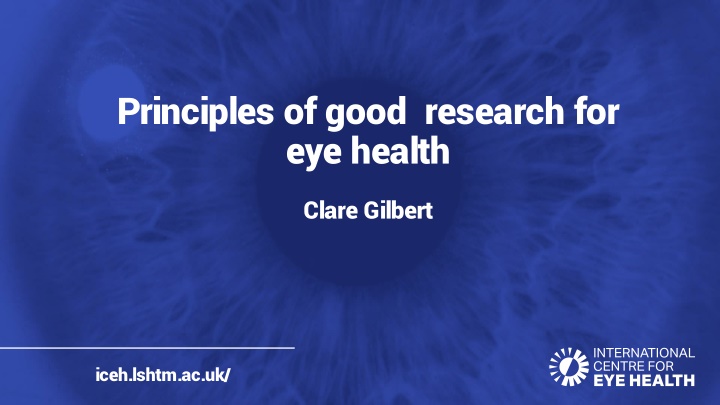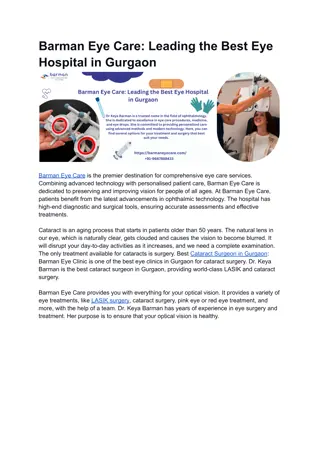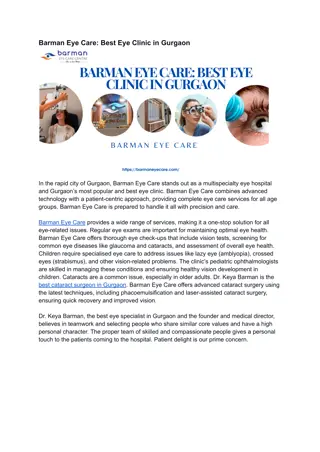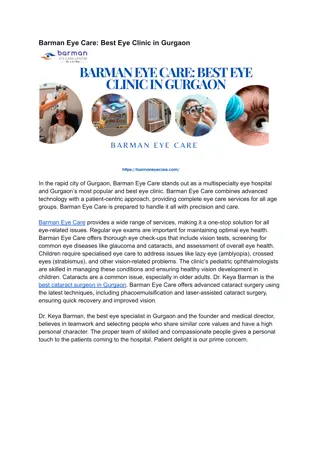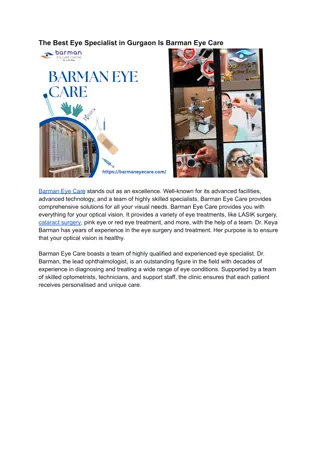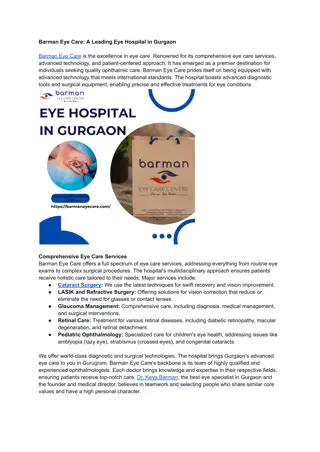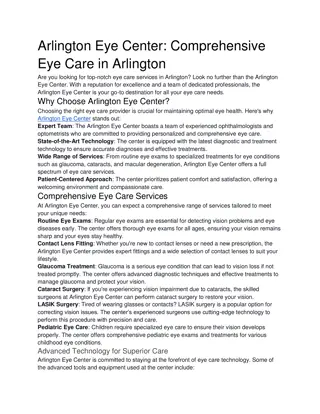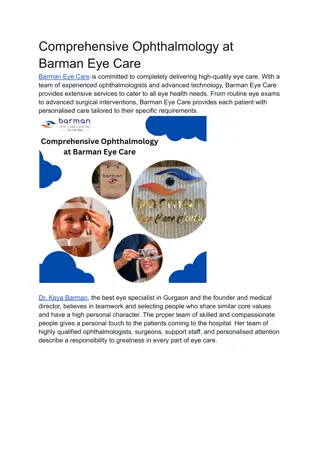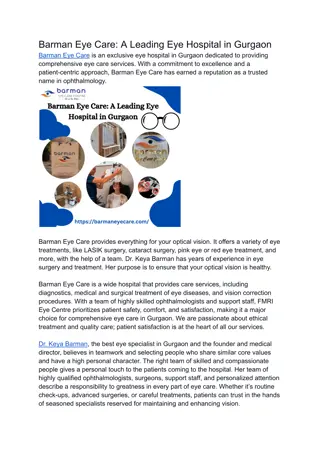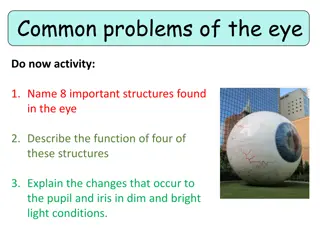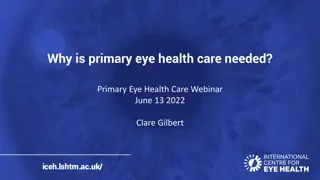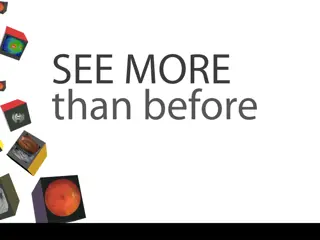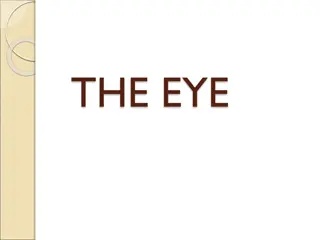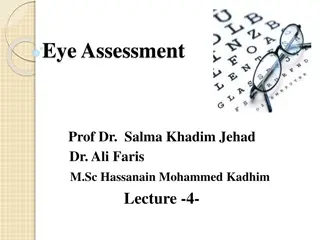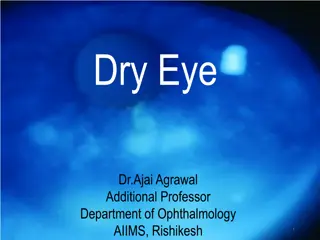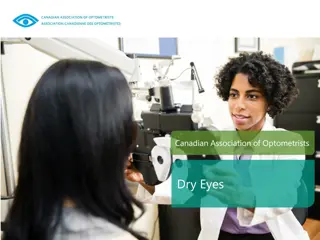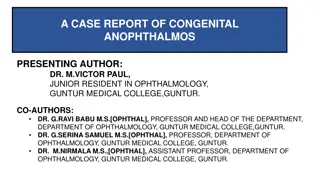Principles of Good Research for Eye Health: A Comprehensive Overview
Explore the essential principles of conducting good research for eye health, including the inverse research law, hierarchy of scientific evidence, and guidance on starting a research project. Learn how to address knowledge gaps, collaborate effectively, and ensure evidence-based decision-making to improve eye health outcomes globally.
Download Presentation

Please find below an Image/Link to download the presentation.
The content on the website is provided AS IS for your information and personal use only. It may not be sold, licensed, or shared on other websites without obtaining consent from the author.If you encounter any issues during the download, it is possible that the publisher has removed the file from their server.
You are allowed to download the files provided on this website for personal or commercial use, subject to the condition that they are used lawfully. All files are the property of their respective owners.
The content on the website is provided AS IS for your information and personal use only. It may not be sold, licensed, or shared on other websites without obtaining consent from the author.
E N D
Presentation Transcript
Principles of good research for eye health Clare Gilbert iceh.lshtm.ac.uk/
Inverse-research law ~90% of people with vision impairment live in low-and middle-income countries Only 30% of published research was undertaken in these regions 2% 5% 11% Central/East Europe, Central Asia High-income Latin America and Caribbean North Africa and Middle East South Asia Southeast Asia, East Asia, Oceania Sub-Saharan Africa 4% Location of primary research 2000-2019 6% 2% 70% Ramke et al. Lancet Commission on Global Eye Health, Supplement
Hierarchy of scientific evidence Synthesis of data from all randomized controlled trials/studies a addressing the same topic Gold standard for assessing a new drug / surgical technique Incidence and risk factors for a condition Risk factors for a condition Surveys: prevalence (and risk factors) for a condition By The Logic Of Science - https://thelogicofscience.files.wordpress.com/2016/04/hierarchy-of-evidence-no-not1.png, CC BY- SA 4.0, https://commons.wikimedia.org/w/index.php?curid=93799763
Principles of good research (for eye health) Purpose To fill gaps in our knowledge by providing evidence that we can trust, use in decision making and build on Without evidence decisions tend to be based on Experience our own or other people s Eminence what the boss says! Eloquence persuasive arguments Expectations of patients, their families or health care workers all of the above are subjective, and are likely to be biased Local research, which addresses local needs and knowledge gaps, is essential
Where to start. oIdentify the problem/knowledge gap you want to address oDecide who are you going to work with; more brains are always better than one! oWhat have other researchers done and found? Find and read other studies oTime spent on detailed, logical planning is very important: once data have been collected it is usually too late to make changes oEverything always takes longer than anticipated . oObservational / descriptive studies are more straightforward than studies which assess an intervention (a new way of doing something, which may be context specific - a new screening or diagnostic test; a new surgical technique or medication)
Planning a study Detailed, logical planning is critical to success . Have an open mind about what you might find Use your imagination Think about assumptions you may have Beware of bias, which can lead to results which are difficult to interpret A study with too few participants may not give valid results; too many participants is a waste of their/your time and resources
Where to start Write down a good research question which addresses the gap identified Clear, specific, concise Problem: Patients with open angle glaucoma are coming back blind because they have not attended follow up Question: What proportion of patients with open angle glaucoma drop out of regular follow up after diagnosis, and which patients are less likely to attend regularly? Problem: Children with congenital cataract are presenting too old for management to give good outcomes Question: Why do children with bilateral congenital cataract present after the age of two years to the eye department?
Problem: The waiting list for adult cataract surgery has grown to one year Question: What are the provider and patient factors which lead to the long waiting list? Problem: During outreach most of the cataract blind individuals are elderly women Question: What factors prevent elderly cataract-blind women from attending for cataract surgery, and what are they willing to pay for surgery? Problem: Many glaucoma patients say they have difficulty putting in their eye drops. Question: What is the best way to teach patients how to put in their eye drops?
Planning an observational study Aim and objectives -Aim: how the data collected will address the problem identified -Objectives: specific activities which need to be undertaken to answer the research question Methods Problem / evidence gap to be addressed Decide methods for each objective -quantitative methods: numbers -qualitative methods: narrative text -mix of the above Research question Clear, specific and concise
Planning an observational study Decide data to be collected -extract data from medical/surgical records -questionnnaires for quantitative data -interviews guides with questions to ask for qualitative data Study participants -patients / family members -community members -eye health professionals -more than one group Develop and pilot test data collection methods -questionnnaires for quantitative data -interviews guides with questions to ask Sample size Decide how many participants are needed to give reliable results
Planning an observational study Ethical approval Not all studies need ethical approval; seek advice from an ethics committee if you are not sure Data analysis Decide how the data are going to be analysed Different methods are needed for quantitative and qualitative methods Plan the logistics Timeframe; staff training; where data will be collected and how (paper; electronic; audio recordings) etc Plan dissemination of results Presentations, publications, reports; feedback to participants etc Budget Best to do this once the methods and logistics have been worked out
What next? Identify people with the relevant expertise (e.g., qualitative research, statistics) and get their input Make revisions Seek an independent opinion from an experienced researcher Listen to what they say Revise the research plan ( protocol )
Planning an observational study Ethical approval Not all studies need ethical approval; seek advice from an ethics committee if you are not sure Data analysis Decide how the data are going to be analysed Different methods are needed for quantitative and qualitative methods Plan the logistics Timeframe; staff training; where data will be collected and how (paper; electronic; audio recordings) etc Plan dissemination of results Presentations, publications, reports; feedback to participants etc Budget Best to do this once the methods and logistics have been worked out
Implementing an observational study Undertaking the study Data collection must be rigorous and of high quality. Needs good data collection intruments; well trained staff; supervision; monitoring of completeness and accuracy of data collection etc Interpret the findings To what extent has the research question been answered? What are the implications of the findings? What are the limitations of the study (all studies have limitations!)? Checking and analysing the data Check completeness of data, and follow the plan for analysis (quantiative and qualitative). May need to report progress to the ethics committee. Disseminate the findings according to the plans
No research is perfect.. But there are poorer or better ways of conducting studies Some studies can be fatally flawed which means they cannot be published e.g., major omission in the data collected; lack of a comparison group It is much better to seek advice early rather than waiting until all the data have been collected before asking someone to help with the analysis or writing up
